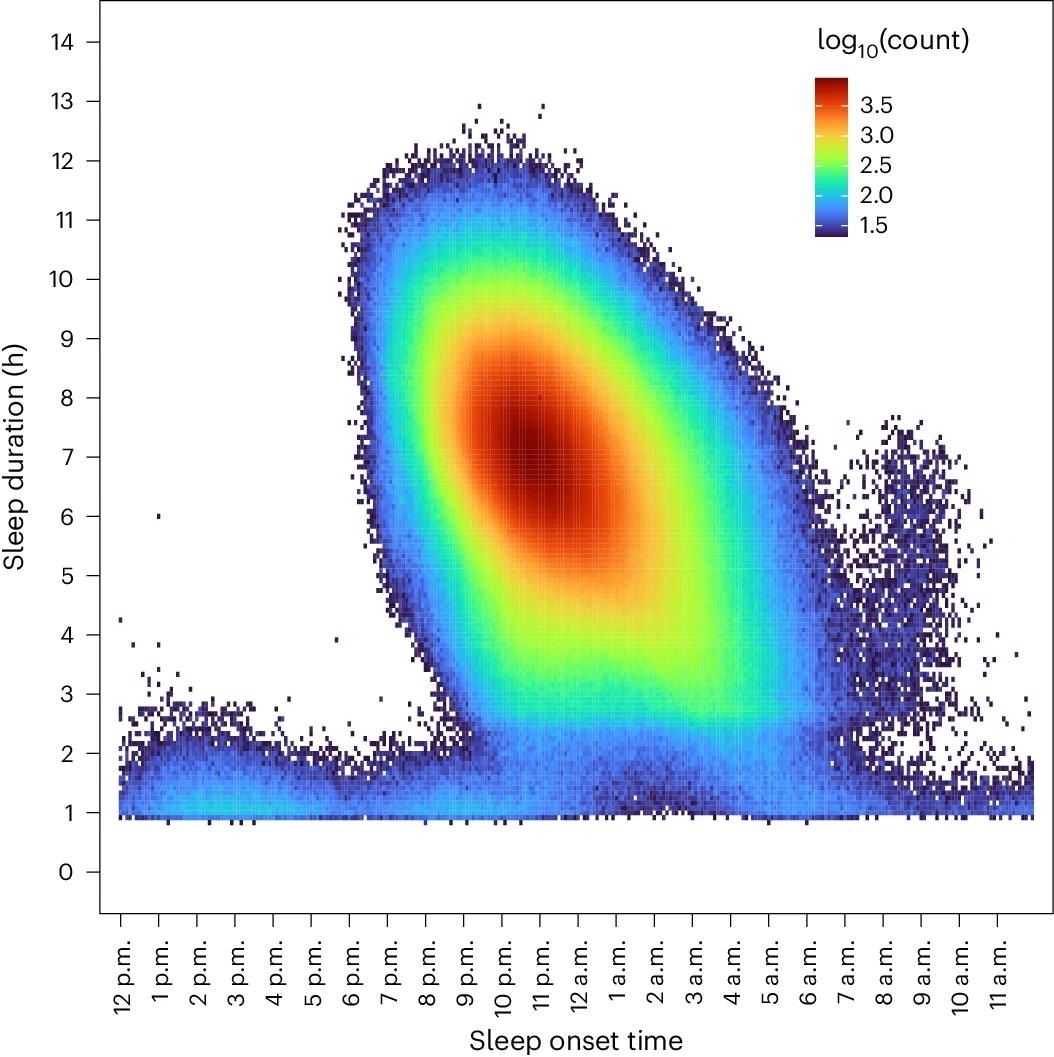A significant body of evidence supports the association between unhealthy sleep durations and the incidence of cardiometabolic and psychiatric disorders, chronic diseases, and all-cause mortality. Studies have reported a J-shaped association between sleep duration and health, with poor health outcomes linked to either too short or too long sleep durations. Seven to nine hours of sleep a day is the recommended sleep duration for adults.
However, the association between sleep patterns involving regularity and sleep stages and the incidence of chronic diseases remains unclear. The studies that have explored these associations have relied largely on self-reported data on sleep patterns, which can often be inaccurate about the longitudinal patterns and sleep stages.
Furthermore, polysomnography, which records brain waves, blood oxygen levels, and heart rate, has financial and temporal constraints, resulting in a dearth of long-term studies. Actigraphy, which uses a noninvasive accelerometer, also has limitations in obtaining longitudinal data on sleep patterns and variations.
About the study
In the present study, the researchers used sleep data obtained from commercial wearable devices to determine whether sleep stages, such as rapid eye movement (REM), N1, N2, and N3 stages, and sleep regularity were associated with the incidence of chronic diseases.
The study used electronic health records obtained from the NIH's All of Us initiative that aimed to gather longitudinal health data from a diverse study population of over a million U.S. residents.
The program invited individuals who regularly used a Fitbit device to share the data from the wearable device, which was linked to the electronic health records. This allowed clinical outcomes to be measured objectively against longitudinal sleep patterns and physical activity data.
The researchers conducted phenome-wide association studies and targeted chronic disease assessments to determine relevant associations between sleep patterns and health for the general population.
The sleep data from the Fitbit devices consisted of sleep duration, time spent in restless sleep based on sleep movements, and sleep stages consisting of REM, deep, and light sleep. The Fitbit device estimates sleep patterns using movement and heart rates. From this data, the researchers calculated each sleep stage's sleep irregularity and percentage time.
The incidence diagnoses in the electronic health records were the primary outcomes examined in this study and included hypertension, obesity, generalized anxiety disorder, major depressive disorder, cardiovascular diseases, hyperthyroidism, hyperlipidemia, and many more chronic diseases.
A survey administered at the onset of the study obtained demographic data such as sex, age, education levels, and race and ethnicity, as well as information on lifestyle factors such as alcohol consumption and smoking. This information was included as covariates when analyzing the association between sleep patterns and the incidence of chronic diseases.
Results
The study found that deep sleep and REM sleep had inverse associations with the probability of incident atrial fibrillation, while an increase in sleep irregularity increased the risk of hyperlipidemia, obesity, major depressive disorder, hypertension, and anxiety disorder.

Heatmap of sleep duration is plotted versus sleep onset time across all person-nights. All sleep periods were flagged as ‘main sleep’ by Fitbit devices.
In concordance with previous studies, a J-shaped association was observed between sleep duration and the incidence of anxiety disorder, hypertension, and major depressive disorder. An increase in the duration of restless sleep was also associated with insomnia and other incident sleep disorders.
The risk of circadian rhythm disorders, hypersomnia, and insomnia was higher for individuals whose sleep onset times were not regularly between 8:00 pm and 2:00 am. The results showed that individuals whose sleep onset times fell within the 'traditional' range of 8:00 pm and 2:00 am also had a lower risk of psychiatric disorders or hypertension.
Furthermore, sleep irregularity was linked to a greater number of chronic disease risks than any other sleep pattern changes. The researchers believe that sleep irregularity causes desynchronization of the circadian rhythms and sleep-wake cycles, which impacts factors such as inflammation, insulin sensitivity, and the functioning of serotonin receptors.
A decrease in the proportion of deep or REM sleep was linked to an increased risk of atrial fibrillation, which was further connected to a higher prevalence of obesity and coronary heart disease after adjusting the analysis for body mass index, sex, and age. This suggests that decreased deep or REM sleep patterns could be a potential marker for atrial fibrillation and overall cardiac ill-health.
Conclusions
The study used longitudinal data from wearable devices and electronic health records to examine associations between sleep stages and patterns and the increased odds of chronic diseases.
The results show that sleep duration, regularity, and quality, involving adequate durations of each stage of sleep, are also essential for good health. Inadequate deep and REM sleep, as well as irregular sleep, were found to increase the odds of atrial fibrillation, obesity, hypertension, and psychiatric disorders such as depression and anxiety.
Journal reference:
- Zheng, N. S., Annis, J., Master, H., Han, L., Gleichauf, K., Ching, J. H., Nasser, M., Coleman, P., Desine, S., Ruderfer, D. M., Hernandez, J., Schneider, L. D., & Brittain, E. L. (2024). Sleep patterns and risk of chronic disease as measured by long-term monitoring with commercial wearable devices in the All of Us Research Program. Nature Medicine. DOI:10.1038/s41591024031558, https://www.nature.com/articles/s41591-024-03155-8